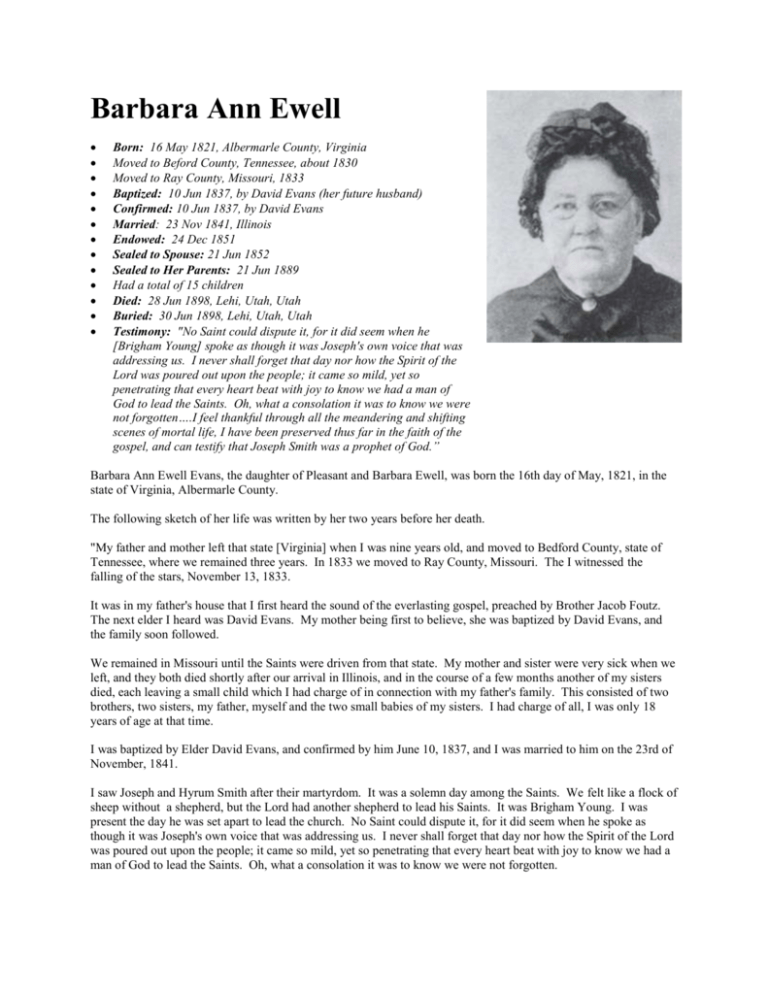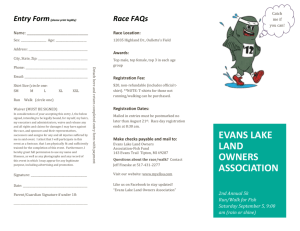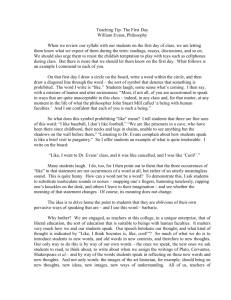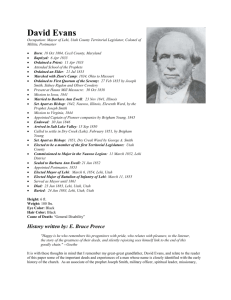Barbara Ann Ewell - Ewell Family Historical & Genealogical Society
advertisement

Barbara Ann Ewell Born: 16 May 1821, Albermarle County, Virginia Moved to Beford County, Tennessee, about 1830 Moved to Ray County, Missouri, 1833 Baptized: 10 Jun 1837, by David Evans (her future husband) Confirmed: 10 Jun 1837, by David Evans Married: 23 Nov 1841, Illinois Endowed: 24 Dec 1851 Sealed to Spouse: 21 Jun 1852 Sealed to Her Parents: 21 Jun 1889 Had a total of 15 children Died: 28 Jun 1898, Lehi, Utah, Utah Buried: 30 Jun 1898, Lehi, Utah, Utah Testimony: "No Saint could dispute it, for it did seem when he [Brigham Young] spoke as though it was Joseph's own voice that was addressing us. I never shall forget that day nor how the Spirit of the Lord was poured out upon the people; it came so mild, yet so penetrating that every heart beat with joy to know we had a man of God to lead the Saints. Oh, what a consolation it was to know we were not forgotten….I feel thankful through all the meandering and shifting scenes of mortal life, I have been preserved thus far in the faith of the gospel, and can testify that Joseph Smith was a prophet of God.” Barbara Ann Ewell Evans, the daughter of Pleasant and Barbara Ewell, was born the 16th day of May, 1821, in the state of Virginia, Albermarle County. The following sketch of her life was written by her two years before her death. "My father and mother left that state [Virginia] when I was nine years old, and moved to Bedford County, state of Tennessee, where we remained three years. In 1833 we moved to Ray County, Missouri. The I witnessed the falling of the stars, November 13, 1833. It was in my father's house that I first heard the sound of the everlasting gospel, preached by Brother Jacob Foutz. The next elder I heard was David Evans. My mother being first to believe, she was baptized by David Evans, and the family soon followed. We remained in Missouri until the Saints were driven from that state. My mother and sister were very sick when we left, and they both died shortly after our arrival in Illinois, and in the course of a few months another of my sisters died, each leaving a small child which I had charge of in connection with my father's family. This consisted of two brothers, two sisters, my father, myself and the two small babies of my sisters. I had charge of all, I was only 18 years of age at that time. I was baptized by Elder David Evans, and confirmed by him June 10, 1837, and I was married to him on the 23rd of November, 1841. I saw Joseph and Hyrum Smith after their martyrdom. It was a solemn day among the Saints. We felt like a flock of sheep without a shepherd, but the Lord had another shepherd to lead his Saints. It was Brigham Young. I was present the day he was set apart to lead the church. No Saint could dispute it, for it did seem when he spoke as though it was Joseph's own voice that was addressing us. I never shall forget that day nor how the Spirit of the Lord was poured out upon the people; it came so mild, yet so penetrating that every heart beat with joy to know we had a man of God to lead the Saints. Oh, what a consolation it was to know we were not forgotten. I remained in Illinois until the exodus from that state, which was in 1846. Some of the Saints had neither teams nor wagon. The brethren united together and made wagons for those that had none; by that means all had wagons, but not teams, and we were obliged to get away, as the mob was howling around, and Nauvoo was threatened. So my husband, being bishop of the Eleventh Ward, concluded to take the teams they had and move as many as they could. We made a start with what teams we had, crossed the Mississippi River, went a day's journey, and set the families down on the prairie. The next day they took the teams and brought the rest Soon after the men got employment breaking prairie and doing other work. We took oxen and milk cows so in the fall all had teams and provisions for winter. I did considerable spinning in the tent, also quilted several quilts. One great blessing, we were generally well. We did not have many luxuries, still we felt thankful for what we had. We then started for Council Bluffs, but it was late in the fall, winter had set in, and we stopped on the headwaters of the Nodaway. The men cut hay and put up log huts. My husband made a sideloom, and I did considerable weaving that winter. The cattle could not live on the frostbitten hay so they commenced to die; our provisions began to get short; and we were obliged to leave in the month of February, 1847. We started for Missouri and lost our way. Our teams that were left gave out, and we had to kill and eat them to save our lives. My husband and two other men, Joseph Smith (of Lehi) and Shaw, went down to Missouri to get fresh teams and provisions, while they left their families camped on a small stream which was called Starvation Creek. We suffered from hunger and cold, but we did not complain, for we were united; we truly lived the order; we all shared alike. My husband came with fresh teams and provisions. I tell you it was a day of rejoicing. We had not heard from them since they left. They had had hard work to get teams. The people were so prejudiced against the Mormons, they were almost to return without anything. My husband told the people he would return and die with the rest of the people. One gentleman spoke and said, "Can't you do something for these me; they seem to be honest?" The men began to volunteer, and he soon had all the provisions and teams he wanted. We then made another start for Missouri. The snow had fallen to a great depth, and we could not keep on the divide. After wallowing in the snow for four or five days, camping on the prairie without fire, we arrived in Nodaway County, Missouri, March 1, 1847. My son, Joseph, was born April 7th, in a house without doors, windows, chimneys or floor. My food was corn bread ground on a hand mill; we had bran for coffee. We stayed there three years, had plenty of work, made a good outfit and started for Utah, May 15th, 1850. My baby was ten days old when we started. After the company got together, Bishop Evans was appointed captain. They were organized, and on June 15 we made a start for Utah. The cholera soon broke out in camp. People were stricken down on every side. There were five deaths in our company, my husband's oldest daughter, Mrs. Ira Hinckley, we one among them. That was a trying time. I had six small children, but none of them had the dreaded disease. Had it not been for that we would have had a pleasant journey. After we arrived at Laramie, we all enjoyed good health. In the year 1850, September 15th, we arrived at Salt Lake Valley , and lived there until February 15, 1851. We then moved to what was called Dry Creek, which was later called Lehi, and we have made our home in Lehi ever since. My husband was appointed bishop of Lehi, also postmaster and served several terms in the Legislature. Our son Hyrum, was drowned at Pelican Point, in Utah Lake, July 29, 1862, age 9 years, 21 days. He had been baptized. I served as Second Counselor in the Relief Society for eleven years. I have done work in three temples, and had a little more to do, but my health would not permit. If I cannot do it, some of my family will attend to it. My son, Eleazer Evans, was called on a mission to Germany. He left October 16, 1883, took a severe cold while in London; still he would not give up until he arrived in Berlin. He was sick all winter. The president released him to return home. He lived just three weeks after his return, when his noble spirit took its flight to God who gave it. I am the mother of fifteen children, seven boys and eight girls, ten of whom are living besides one adopted child, the daughter of Louise and John Beck; grand children 101, 86 living, 21 dead; great grand children 51, 43 living, and 8 are dead. I was 75 years old May 16, 1896. All my children living are married and have families, and live in Utah. I have been a widow 13 years, was left with three children. I feel thankful through all the meandering and shifting scenes of mortal life, I have been preserved thus far in the faith of the gospel, and can testify that Joseph Smith was a prophet of God.” Our Pioneer Heritage, Vol. 4, p.566 The autumn of 1870 saw Lehi in communication with the outside world through one of the modern inventions—the telegraph. A. Milton Musser, superintendent of the Deseret Telegraph Company, installed at that time an office of his company in the residence of Bishop Evans and placed Miss Ina Johnson of Springville in charge. The company offered to teach telegraphy to any of the local young women, and promised to place the office in their charge when they had reached a stage of sufficient proficiency. Three young ladies from Lehi, Barbara A. Evans, daughter of Bishop David L. Evans and Barbara Ewell Evans, Isabella Karren and Harriet Zimmerman undertook to solve the mysteries of dots and dashes under the tutorship of Miss Johnson. They were to be paid $5.00 a month. Since the office was in the Evans home, Barbara progressed more rapidly than her rivals and obtained the position. The telegraph continued in operation until 1872, when because of insufficient receipts, it was abandoned. Miss Evans then accepted a similar position in Farmington, Davis county. Ruth K. Wanless.






